
Sales
CRM vs. Lead Management System
CRM vs. Lead Management System
2025-02-04

Sales
CRM vs. Lead Management System
2025-02-04

Sales
CRM vs. Lead Management System
2025-02-04
For your business to succeed, you need to generate sales. You’ll need a constant flow of prospects and repeat customers to create those sales. For sales prospects to become paying customers, you’ll need to nurture relationships with them throughout each stage of your buyer’s journey.
That’s where customer relationship management (CRM) and lead management systems come in. Both of these systems are designed to help you generate and maintain relationships with leads and customers. These two systems are frequently referred to interchangeably because although they serve different functions, they serve common goals.
We’ll discuss the differences between CRM and lead management systems, detailing the benefits of each. This article will help you learn which one is right for your business. You will also be introduced to LeadBoxer’s lead management software and all it has to offer.
Keep reading or “jump ahead” to the topics listed below:
For your business to succeed, you need to generate sales. You’ll need a constant flow of prospects and repeat customers to create those sales. For sales prospects to become paying customers, you’ll need to nurture relationships with them throughout each stage of your buyer’s journey.
That’s where customer relationship management (CRM) and lead management systems come in. Both of these systems are designed to help you generate and maintain relationships with leads and customers. These two systems are frequently referred to interchangeably because although they serve different functions, they serve common goals.
We’ll discuss the differences between CRM and lead management systems, detailing the benefits of each. This article will help you learn which one is right for your business. You will also be introduced to LeadBoxer’s lead management software and all it has to offer.
Keep reading or “jump ahead” to the topics listed below:
For your business to succeed, you need to generate sales. You’ll need a constant flow of prospects and repeat customers to create those sales. For sales prospects to become paying customers, you’ll need to nurture relationships with them throughout each stage of your buyer’s journey.
That’s where customer relationship management (CRM) and lead management systems come in. Both of these systems are designed to help you generate and maintain relationships with leads and customers. These two systems are frequently referred to interchangeably because although they serve different functions, they serve common goals.
We’ll discuss the differences between CRM and lead management systems, detailing the benefits of each. This article will help you learn which one is right for your business. You will also be introduced to LeadBoxer’s lead management software and all it has to offer.
Keep reading or “jump ahead” to the topics listed below:
For your business to succeed, you need to generate sales. You’ll need a constant flow of prospects and repeat customers to create those sales. For sales prospects to become paying customers, you’ll need to nurture relationships with them throughout each stage of your buyer’s journey.
That’s where customer relationship management (CRM) and lead management systems come in. Both of these systems are designed to help you generate and maintain relationships with leads and customers. These two systems are frequently referred to interchangeably because although they serve different functions, they serve common goals.
We’ll discuss the differences between CRM and lead management systems, detailing the benefits of each. This article will help you learn which one is right for your business. You will also be introduced to LeadBoxer’s lead management software and all it has to offer.
Keep reading or “jump ahead” to the topics listed below:
Table of Contents
Auto Generated TOC
Auto Generated TOC
Auto Generated TOC
Auto Generated TOC
Super easy and powerful Lead Managent
See all your leads and how qualified they are in one view




The Difference Between CRM and Lead Management Software
Whether you are in B2B sales or marketing, initiating and maintaining relationships with your leads and customers is crucial. You have most likely heard of or used CRM and lead management software systems to foster and document interactions in these relationships. While it may be easy to conflate these two systems and think of them as similar platforms, there are notable differences.
What is CRM Software?
Today, most companies use CRM software, which is used primarily by sales teams to document the customer journeys of leads and clients. The customer journey begins with lead generation and ends with customer retention. It includes all the marketing and sales touchpoints in the funnel that improve the customer experience.
CRM software stores lead and customer information so you can build a database to maintain and nurture relationships with them. With the information stored in the database, you provide better customer service to prospects and customers throughout your funnel.
A CRM system helps you increase your customer’s lifetime value by allowing you to nurture leads so they become customers. CRM software is often used with a lead management system to generate leads to be nurtured.
Though CRM software moves prospects through the stages of marketing and sales funnels, it also has its own stages. It begins with the pre-CRM stage and ends with the sale and delivery of goods or services.
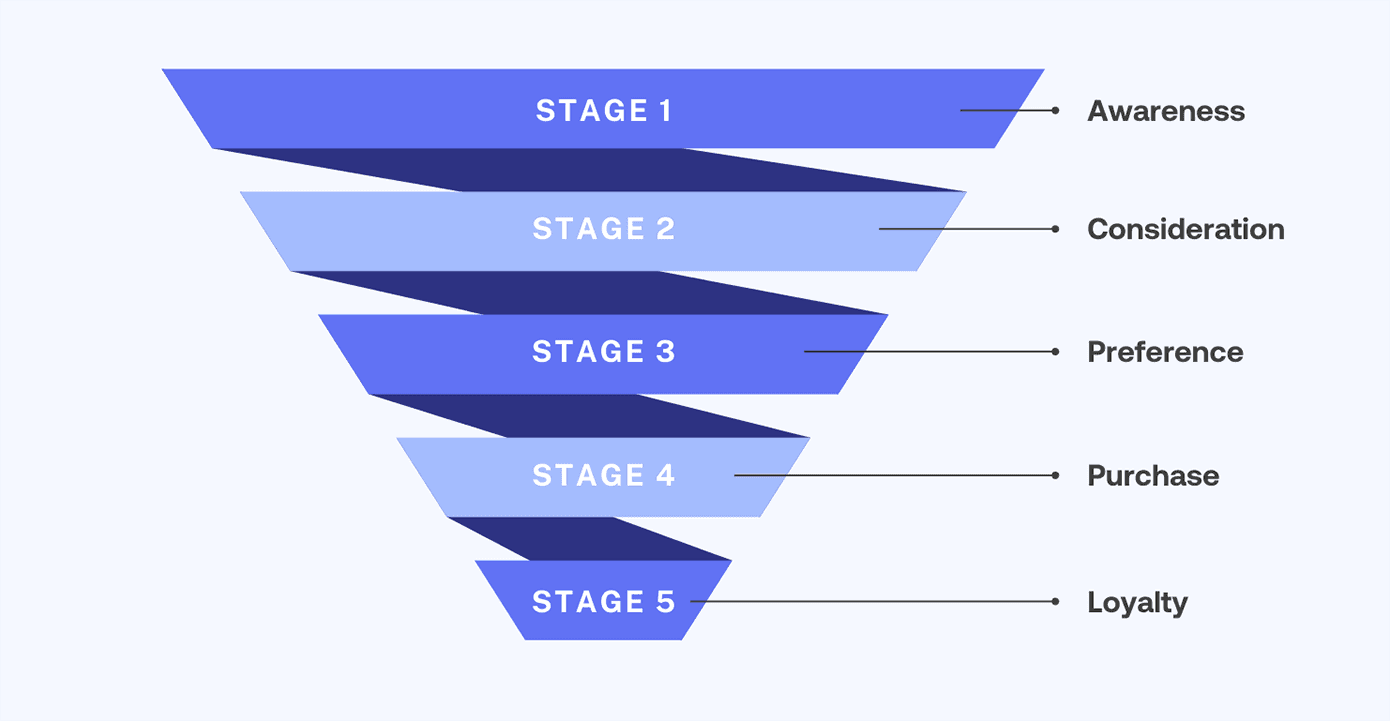
Source
CRM software is vital for any business that needs lead generation. It offers the following benefits that can help engage customers and equip your business to make more sales.
The Benefits of a CRM System:
Provides a one-stop shop for all your marketing and sales activities. This makes it easy to keep your customer and lead management in one consolidated system.
Betters your customer experience. Certain CRM software has helpdesk system integrations. Improved customer service gives your leads and customers a better experience with your brand.
Increases revenue. CRM software helps you nurture leads into customers and customers into repeat customers. CRM software also identifies upselling and cross-selling opportunities, increasing revenue and sales opportunities.
Scale your sales. Many CRM software programs are scalable which helps you expand your sales and marketing activities as your company grows.
Get better sales insights. With CRM software, you can get data and reports on repeat sales, customer shopping history, and conversion rates. This information is vital for sales forecasting.
Increase communication between teams. Both your sales and marketing teams can use the same CRM software to nurture leads. This creates a seamless handoff between marketing and sales and improves customer service.
What is Lead Management Software?
Unlike CRM software which focuses on nurturing leads and customers, lead management software focuses on lead generation. It helps your marketing and sales teams find, track, and store leads. Lead management software essentially concludes when a lead converts to become a customer.
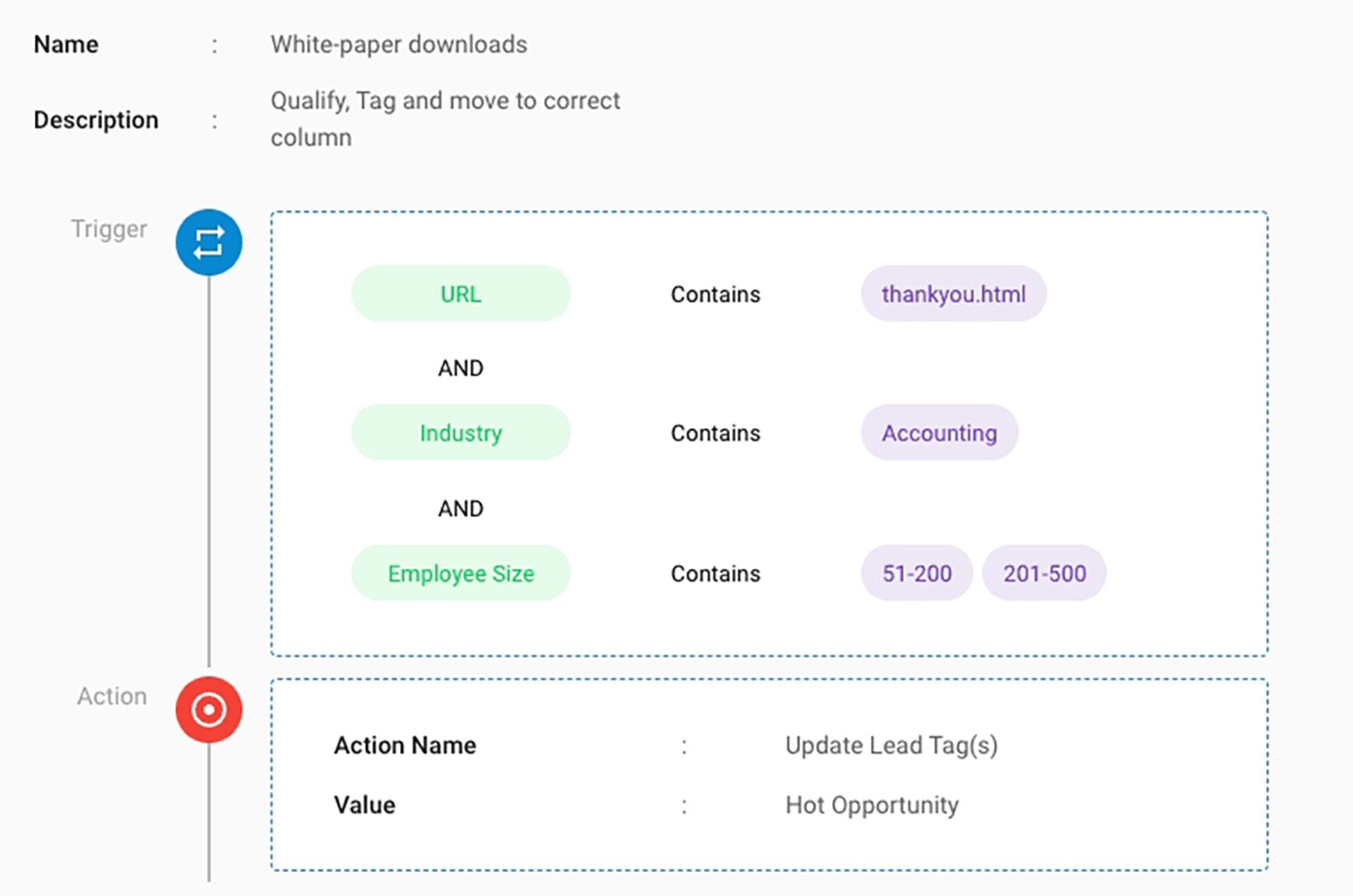
Source
Lead management is a vital component of any business. It is primarily used by a marketing team to qualify leads and nurture them to be handed off to the sales team. Like with CRMs, lead software is built around cultivating relationships with prospects.
If you think that because you have a CRM, your lead management is covered, you may want to think again. Take a look at the benefits of lead management software listed below:
The Benefits of Lead Management Software:
Efficiently manage inbound and outbound leads. Lead software helps you keep track of your leads, reducing the number of inbound and outbound leads that fall through the cracks. Lead software prompts your salespeople to take appropriate action on stalled leads.
Easily filter and segment leads. Lead management software helps you identify which leads are most likely to convert. You can also target those leads to move them through your sales funnel.
More effective lead nurturing. Lead management software helps your salespeople nurture leads through your sales funnel.
Improved team collaboration and workflow. Since lead management systems are focused on leads, it is easy for your sales team to communicate with each other. Lead workflow is also defined, helping you move leads through your sales cycle.
Cost-efficient. While lead management software lacks some of the features of a CRM system, it is less expensive.
Which System is Right for Your Business?
Now that you know the differences between CRM and lead management software, which is best for your business? This comes down to the size of your business, your goals, and how your sales and marketing teams are structured.
For small or new businesses, lead management software is a better option since it concentrates on lead generation. Additionally, lead management programs keep your sales teams focused on lead nurturing.
For businesses that want all their customer relationship-building activities in one place, CRM software is a better option. CRM software is a good option for larger, established businesses that can also integrate other business systems into the CRM. As your business expands, be sure to invest in more robust CRM software that offers more integrations and capabilities.
To maximize your sales and revenue, it’s a good idea to have both lead management and CRM software. Both systems work with each other to generate customers and sales. If you’re going this route, make sure your lead generation software integrates seamlessly with your chosen CRM.
To maximize sales, teams will use a CRM to nurture leads generated through lead management software. Lead management software is especially useful for marketing teams to generate and qualify leads for the sales team. Your sales team can then nurture these qualified leads with your CRM software.
LeadBoxer’s Lead Management Software: 3 Key Features
You have a CRM that you’re happy with, but you want to see a higher volume of qualified leads. The more leads you have to nurture, the more you can maximize the effectiveness of your CRM. There are numerous lead management programs out there. So, why consider LeadBoxer? Check out the list below of three key features that set LeadBoxer apart when it comes to easily generating and qualifying leads:
1. Visual Lead Management
LeadBoxer’s lead management software helps your marketing and sales teams visually see where each lead is in the buyer’s journey. When you know which stage a lead is in, you can readily interact with and nurture them with appropriate communication. When leads are presented with the proper communication and information, they are more likely to proceed to the next stage.
With LeadBoxer’s lead management program, your leads are displayed on a lead board, providing a visual representation of the buyer’s journey. You can customize your lead board with your company’s lead stages and key events or triggers at each stage.
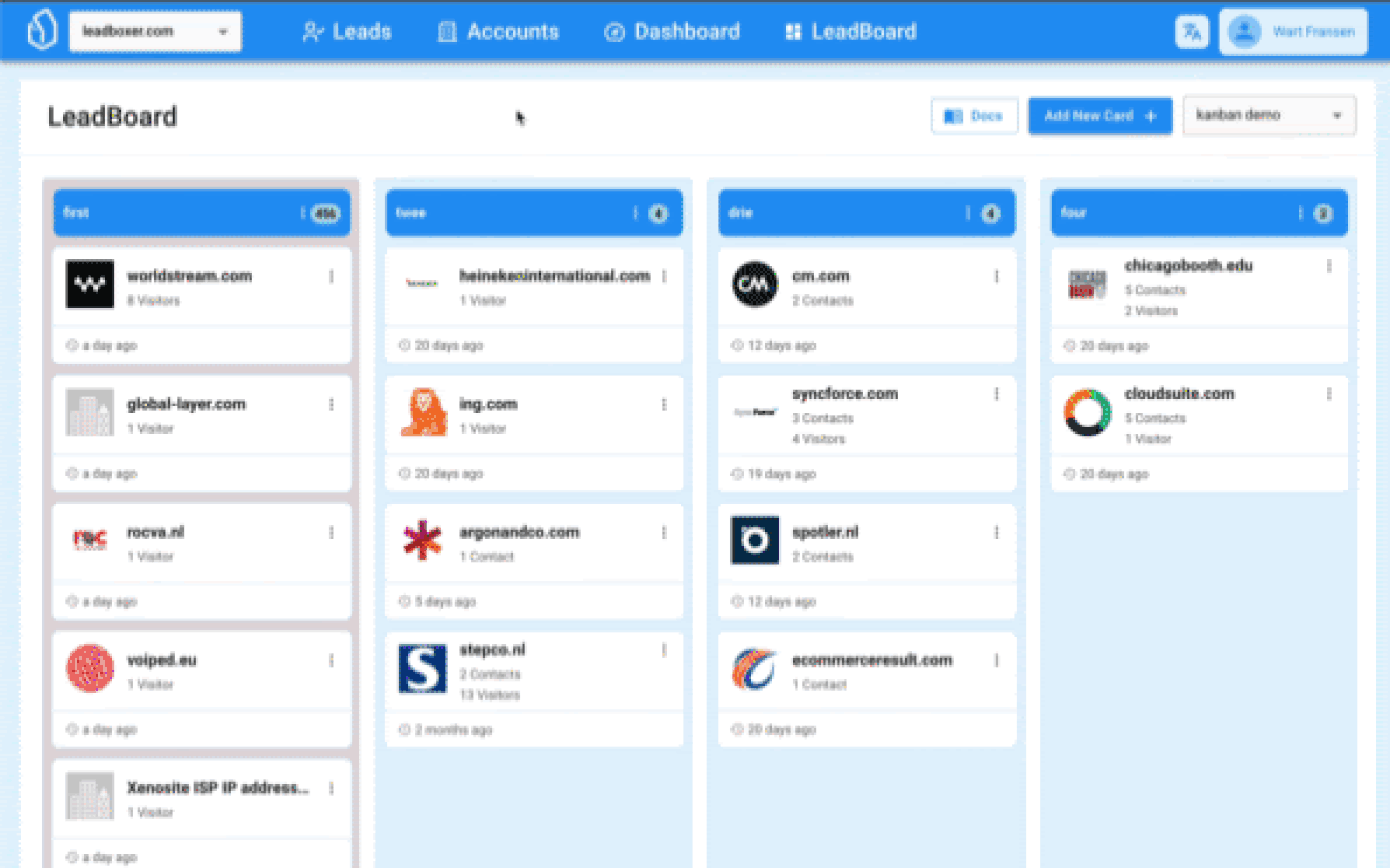
Source
2. Workflow Automation
LeadBoxer’s lead management software not only visually lays out your leads; it also moves them through your buyer’s journey. You’ll set up benchmarks or triggers that move leads from one stage of your buyer’s journey to the next. These are set up as you’re creating your lead board.
Once you have created your lead board, your funnel stages, and their corresponding benchmarks, you build a workflow to nurture leads. Once your workflow is created, LeadBoxer’s lead management software runs the workflow automatically. All you have to do is sit back and relax.
3. CRM Integration
LeadBoxer’s lead management software integrates with many of the top CRM programs like PipeDrive, Marketo, and HubSpot. With these seamless integrations, your marketing and sales teams can generate leads and nurture them into paying customers.
The Importance of Advanced Lead Qualification
As mentioned earlier, not every lead you generate will convert into a sale. Lead qualification is an essential element to sales success. It ensures your sales team invests time and energy into nurturing only those leads that are most likely to convert.
Know What Stage Your Buyer Is in
An important way to gauge how ready your leads are to convert is to look and see what stage in the buyer’s journey they are currently in. Are they at the top of the funnel, just having entered the awareness stage or are they at the bottom of the funnel, in the decision stage?
If they are in the awareness stage, do they recognize their pain points? If they are ready to convert, are they financially able to do so at this point? If the answer is ‘yes,’ the lead may be worth nurturing.
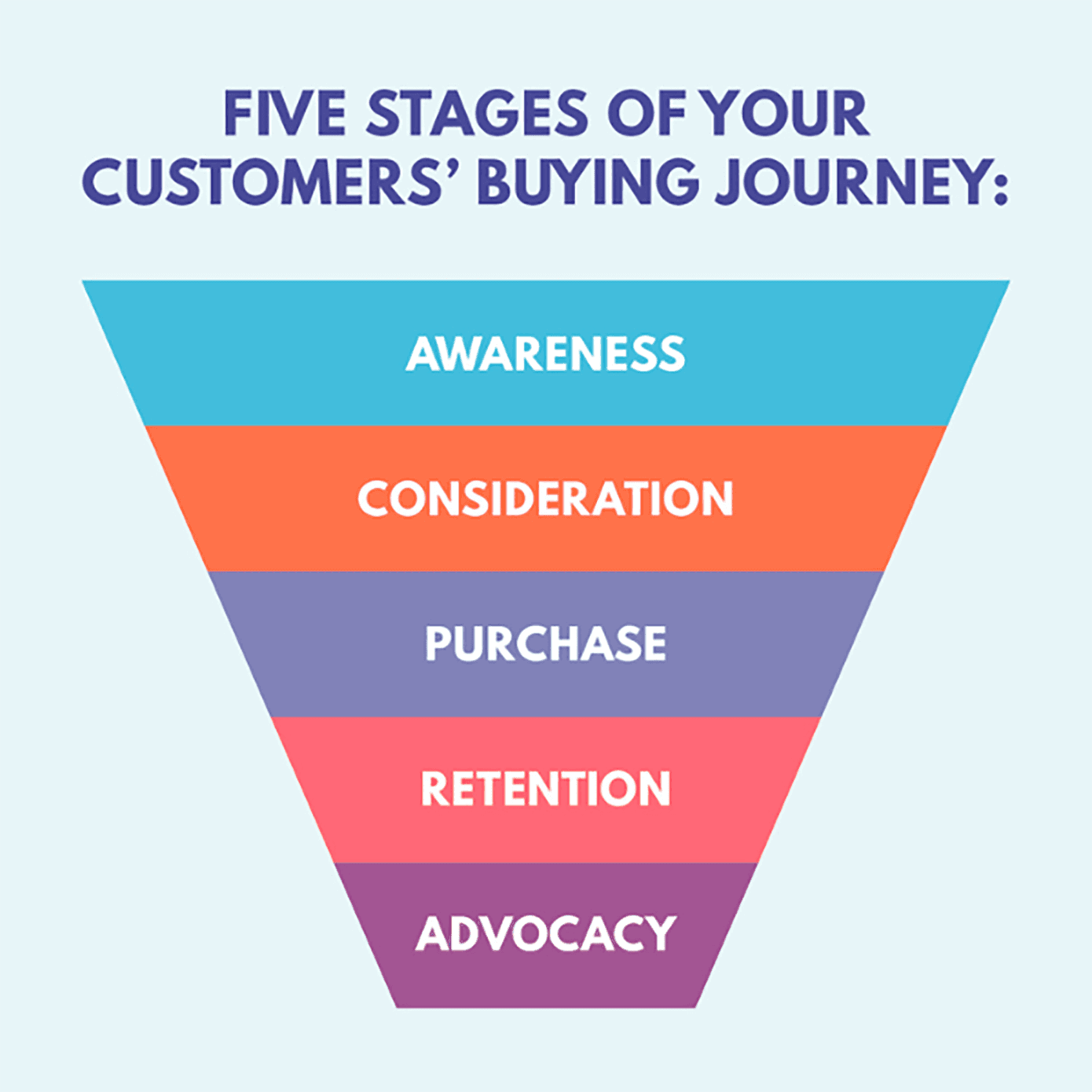
Source
Not all of the leads that enter your customer journey funnel will convert to paying customers. You will also have leads that will stall inside your funnel. Take note of these and analyze their trajectory to try and determine why they have failed to progress to conversion, but don’t spend too much time on them.
LeadBoxer can help you identify, qualify, and manage your leads so they become paying customers. To learn more about LeadBoxer’s advanced lead management solutions and all the platform offers, sign up for your free trial today!
The Difference Between CRM and Lead Management Software
Whether you are in B2B sales or marketing, initiating and maintaining relationships with your leads and customers is crucial. You have most likely heard of or used CRM and lead management software systems to foster and document interactions in these relationships. While it may be easy to conflate these two systems and think of them as similar platforms, there are notable differences.
What is CRM Software?
Today, most companies use CRM software, which is used primarily by sales teams to document the customer journeys of leads and clients. The customer journey begins with lead generation and ends with customer retention. It includes all the marketing and sales touchpoints in the funnel that improve the customer experience.
CRM software stores lead and customer information so you can build a database to maintain and nurture relationships with them. With the information stored in the database, you provide better customer service to prospects and customers throughout your funnel.
A CRM system helps you increase your customer’s lifetime value by allowing you to nurture leads so they become customers. CRM software is often used with a lead management system to generate leads to be nurtured.
Though CRM software moves prospects through the stages of marketing and sales funnels, it also has its own stages. It begins with the pre-CRM stage and ends with the sale and delivery of goods or services.

Source
CRM software is vital for any business that needs lead generation. It offers the following benefits that can help engage customers and equip your business to make more sales.
The Benefits of a CRM System:
Provides a one-stop shop for all your marketing and sales activities. This makes it easy to keep your customer and lead management in one consolidated system.
Betters your customer experience. Certain CRM software has helpdesk system integrations. Improved customer service gives your leads and customers a better experience with your brand.
Increases revenue. CRM software helps you nurture leads into customers and customers into repeat customers. CRM software also identifies upselling and cross-selling opportunities, increasing revenue and sales opportunities.
Scale your sales. Many CRM software programs are scalable which helps you expand your sales and marketing activities as your company grows.
Get better sales insights. With CRM software, you can get data and reports on repeat sales, customer shopping history, and conversion rates. This information is vital for sales forecasting.
Increase communication between teams. Both your sales and marketing teams can use the same CRM software to nurture leads. This creates a seamless handoff between marketing and sales and improves customer service.
What is Lead Management Software?
Unlike CRM software which focuses on nurturing leads and customers, lead management software focuses on lead generation. It helps your marketing and sales teams find, track, and store leads. Lead management software essentially concludes when a lead converts to become a customer.

Source
Lead management is a vital component of any business. It is primarily used by a marketing team to qualify leads and nurture them to be handed off to the sales team. Like with CRMs, lead software is built around cultivating relationships with prospects.
If you think that because you have a CRM, your lead management is covered, you may want to think again. Take a look at the benefits of lead management software listed below:
The Benefits of Lead Management Software:
Efficiently manage inbound and outbound leads. Lead software helps you keep track of your leads, reducing the number of inbound and outbound leads that fall through the cracks. Lead software prompts your salespeople to take appropriate action on stalled leads.
Easily filter and segment leads. Lead management software helps you identify which leads are most likely to convert. You can also target those leads to move them through your sales funnel.
More effective lead nurturing. Lead management software helps your salespeople nurture leads through your sales funnel.
Improved team collaboration and workflow. Since lead management systems are focused on leads, it is easy for your sales team to communicate with each other. Lead workflow is also defined, helping you move leads through your sales cycle.
Cost-efficient. While lead management software lacks some of the features of a CRM system, it is less expensive.
Which System is Right for Your Business?
Now that you know the differences between CRM and lead management software, which is best for your business? This comes down to the size of your business, your goals, and how your sales and marketing teams are structured.
For small or new businesses, lead management software is a better option since it concentrates on lead generation. Additionally, lead management programs keep your sales teams focused on lead nurturing.
For businesses that want all their customer relationship-building activities in one place, CRM software is a better option. CRM software is a good option for larger, established businesses that can also integrate other business systems into the CRM. As your business expands, be sure to invest in more robust CRM software that offers more integrations and capabilities.
To maximize your sales and revenue, it’s a good idea to have both lead management and CRM software. Both systems work with each other to generate customers and sales. If you’re going this route, make sure your lead generation software integrates seamlessly with your chosen CRM.
To maximize sales, teams will use a CRM to nurture leads generated through lead management software. Lead management software is especially useful for marketing teams to generate and qualify leads for the sales team. Your sales team can then nurture these qualified leads with your CRM software.
LeadBoxer’s Lead Management Software: 3 Key Features
You have a CRM that you’re happy with, but you want to see a higher volume of qualified leads. The more leads you have to nurture, the more you can maximize the effectiveness of your CRM. There are numerous lead management programs out there. So, why consider LeadBoxer? Check out the list below of three key features that set LeadBoxer apart when it comes to easily generating and qualifying leads:
1. Visual Lead Management
LeadBoxer’s lead management software helps your marketing and sales teams visually see where each lead is in the buyer’s journey. When you know which stage a lead is in, you can readily interact with and nurture them with appropriate communication. When leads are presented with the proper communication and information, they are more likely to proceed to the next stage.
With LeadBoxer’s lead management program, your leads are displayed on a lead board, providing a visual representation of the buyer’s journey. You can customize your lead board with your company’s lead stages and key events or triggers at each stage.

Source
2. Workflow Automation
LeadBoxer’s lead management software not only visually lays out your leads; it also moves them through your buyer’s journey. You’ll set up benchmarks or triggers that move leads from one stage of your buyer’s journey to the next. These are set up as you’re creating your lead board.
Once you have created your lead board, your funnel stages, and their corresponding benchmarks, you build a workflow to nurture leads. Once your workflow is created, LeadBoxer’s lead management software runs the workflow automatically. All you have to do is sit back and relax.
3. CRM Integration
LeadBoxer’s lead management software integrates with many of the top CRM programs like PipeDrive, Marketo, and HubSpot. With these seamless integrations, your marketing and sales teams can generate leads and nurture them into paying customers.
The Importance of Advanced Lead Qualification
As mentioned earlier, not every lead you generate will convert into a sale. Lead qualification is an essential element to sales success. It ensures your sales team invests time and energy into nurturing only those leads that are most likely to convert.
Know What Stage Your Buyer Is in
An important way to gauge how ready your leads are to convert is to look and see what stage in the buyer’s journey they are currently in. Are they at the top of the funnel, just having entered the awareness stage or are they at the bottom of the funnel, in the decision stage?
If they are in the awareness stage, do they recognize their pain points? If they are ready to convert, are they financially able to do so at this point? If the answer is ‘yes,’ the lead may be worth nurturing.

Source
Not all of the leads that enter your customer journey funnel will convert to paying customers. You will also have leads that will stall inside your funnel. Take note of these and analyze their trajectory to try and determine why they have failed to progress to conversion, but don’t spend too much time on them.
LeadBoxer can help you identify, qualify, and manage your leads so they become paying customers. To learn more about LeadBoxer’s advanced lead management solutions and all the platform offers, sign up for your free trial today!
The Difference Between CRM and Lead Management Software
Whether you are in B2B sales or marketing, initiating and maintaining relationships with your leads and customers is crucial. You have most likely heard of or used CRM and lead management software systems to foster and document interactions in these relationships. While it may be easy to conflate these two systems and think of them as similar platforms, there are notable differences.
What is CRM Software?
Today, most companies use CRM software, which is used primarily by sales teams to document the customer journeys of leads and clients. The customer journey begins with lead generation and ends with customer retention. It includes all the marketing and sales touchpoints in the funnel that improve the customer experience.
CRM software stores lead and customer information so you can build a database to maintain and nurture relationships with them. With the information stored in the database, you provide better customer service to prospects and customers throughout your funnel.
A CRM system helps you increase your customer’s lifetime value by allowing you to nurture leads so they become customers. CRM software is often used with a lead management system to generate leads to be nurtured.
Though CRM software moves prospects through the stages of marketing and sales funnels, it also has its own stages. It begins with the pre-CRM stage and ends with the sale and delivery of goods or services.

Source
CRM software is vital for any business that needs lead generation. It offers the following benefits that can help engage customers and equip your business to make more sales.
The Benefits of a CRM System:
Provides a one-stop shop for all your marketing and sales activities. This makes it easy to keep your customer and lead management in one consolidated system.
Betters your customer experience. Certain CRM software has helpdesk system integrations. Improved customer service gives your leads and customers a better experience with your brand.
Increases revenue. CRM software helps you nurture leads into customers and customers into repeat customers. CRM software also identifies upselling and cross-selling opportunities, increasing revenue and sales opportunities.
Scale your sales. Many CRM software programs are scalable which helps you expand your sales and marketing activities as your company grows.
Get better sales insights. With CRM software, you can get data and reports on repeat sales, customer shopping history, and conversion rates. This information is vital for sales forecasting.
Increase communication between teams. Both your sales and marketing teams can use the same CRM software to nurture leads. This creates a seamless handoff between marketing and sales and improves customer service.
What is Lead Management Software?
Unlike CRM software which focuses on nurturing leads and customers, lead management software focuses on lead generation. It helps your marketing and sales teams find, track, and store leads. Lead management software essentially concludes when a lead converts to become a customer.

Source
Lead management is a vital component of any business. It is primarily used by a marketing team to qualify leads and nurture them to be handed off to the sales team. Like with CRMs, lead software is built around cultivating relationships with prospects.
If you think that because you have a CRM, your lead management is covered, you may want to think again. Take a look at the benefits of lead management software listed below:
The Benefits of Lead Management Software:
Efficiently manage inbound and outbound leads. Lead software helps you keep track of your leads, reducing the number of inbound and outbound leads that fall through the cracks. Lead software prompts your salespeople to take appropriate action on stalled leads.
Easily filter and segment leads. Lead management software helps you identify which leads are most likely to convert. You can also target those leads to move them through your sales funnel.
More effective lead nurturing. Lead management software helps your salespeople nurture leads through your sales funnel.
Improved team collaboration and workflow. Since lead management systems are focused on leads, it is easy for your sales team to communicate with each other. Lead workflow is also defined, helping you move leads through your sales cycle.
Cost-efficient. While lead management software lacks some of the features of a CRM system, it is less expensive.
Which System is Right for Your Business?
Now that you know the differences between CRM and lead management software, which is best for your business? This comes down to the size of your business, your goals, and how your sales and marketing teams are structured.
For small or new businesses, lead management software is a better option since it concentrates on lead generation. Additionally, lead management programs keep your sales teams focused on lead nurturing.
For businesses that want all their customer relationship-building activities in one place, CRM software is a better option. CRM software is a good option for larger, established businesses that can also integrate other business systems into the CRM. As your business expands, be sure to invest in more robust CRM software that offers more integrations and capabilities.
To maximize your sales and revenue, it’s a good idea to have both lead management and CRM software. Both systems work with each other to generate customers and sales. If you’re going this route, make sure your lead generation software integrates seamlessly with your chosen CRM.
To maximize sales, teams will use a CRM to nurture leads generated through lead management software. Lead management software is especially useful for marketing teams to generate and qualify leads for the sales team. Your sales team can then nurture these qualified leads with your CRM software.
LeadBoxer’s Lead Management Software: 3 Key Features
You have a CRM that you’re happy with, but you want to see a higher volume of qualified leads. The more leads you have to nurture, the more you can maximize the effectiveness of your CRM. There are numerous lead management programs out there. So, why consider LeadBoxer? Check out the list below of three key features that set LeadBoxer apart when it comes to easily generating and qualifying leads:
1. Visual Lead Management
LeadBoxer’s lead management software helps your marketing and sales teams visually see where each lead is in the buyer’s journey. When you know which stage a lead is in, you can readily interact with and nurture them with appropriate communication. When leads are presented with the proper communication and information, they are more likely to proceed to the next stage.
With LeadBoxer’s lead management program, your leads are displayed on a lead board, providing a visual representation of the buyer’s journey. You can customize your lead board with your company’s lead stages and key events or triggers at each stage.

Source
2. Workflow Automation
LeadBoxer’s lead management software not only visually lays out your leads; it also moves them through your buyer’s journey. You’ll set up benchmarks or triggers that move leads from one stage of your buyer’s journey to the next. These are set up as you’re creating your lead board.
Once you have created your lead board, your funnel stages, and their corresponding benchmarks, you build a workflow to nurture leads. Once your workflow is created, LeadBoxer’s lead management software runs the workflow automatically. All you have to do is sit back and relax.
3. CRM Integration
LeadBoxer’s lead management software integrates with many of the top CRM programs like PipeDrive, Marketo, and HubSpot. With these seamless integrations, your marketing and sales teams can generate leads and nurture them into paying customers.
The Importance of Advanced Lead Qualification
As mentioned earlier, not every lead you generate will convert into a sale. Lead qualification is an essential element to sales success. It ensures your sales team invests time and energy into nurturing only those leads that are most likely to convert.
Know What Stage Your Buyer Is in
An important way to gauge how ready your leads are to convert is to look and see what stage in the buyer’s journey they are currently in. Are they at the top of the funnel, just having entered the awareness stage or are they at the bottom of the funnel, in the decision stage?
If they are in the awareness stage, do they recognize their pain points? If they are ready to convert, are they financially able to do so at this point? If the answer is ‘yes,’ the lead may be worth nurturing.

Source
Not all of the leads that enter your customer journey funnel will convert to paying customers. You will also have leads that will stall inside your funnel. Take note of these and analyze their trajectory to try and determine why they have failed to progress to conversion, but don’t spend too much time on them.
LeadBoxer can help you identify, qualify, and manage your leads so they become paying customers. To learn more about LeadBoxer’s advanced lead management solutions and all the platform offers, sign up for your free trial today!
The Difference Between CRM and Lead Management Software
Whether you are in B2B sales or marketing, initiating and maintaining relationships with your leads and customers is crucial. You have most likely heard of or used CRM and lead management software systems to foster and document interactions in these relationships. While it may be easy to conflate these two systems and think of them as similar platforms, there are notable differences.
What is CRM Software?
Today, most companies use CRM software, which is used primarily by sales teams to document the customer journeys of leads and clients. The customer journey begins with lead generation and ends with customer retention. It includes all the marketing and sales touchpoints in the funnel that improve the customer experience.
CRM software stores lead and customer information so you can build a database to maintain and nurture relationships with them. With the information stored in the database, you provide better customer service to prospects and customers throughout your funnel.
A CRM system helps you increase your customer’s lifetime value by allowing you to nurture leads so they become customers. CRM software is often used with a lead management system to generate leads to be nurtured.
Though CRM software moves prospects through the stages of marketing and sales funnels, it also has its own stages. It begins with the pre-CRM stage and ends with the sale and delivery of goods or services.

Source
CRM software is vital for any business that needs lead generation. It offers the following benefits that can help engage customers and equip your business to make more sales.
The Benefits of a CRM System:
Provides a one-stop shop for all your marketing and sales activities. This makes it easy to keep your customer and lead management in one consolidated system.
Betters your customer experience. Certain CRM software has helpdesk system integrations. Improved customer service gives your leads and customers a better experience with your brand.
Increases revenue. CRM software helps you nurture leads into customers and customers into repeat customers. CRM software also identifies upselling and cross-selling opportunities, increasing revenue and sales opportunities.
Scale your sales. Many CRM software programs are scalable which helps you expand your sales and marketing activities as your company grows.
Get better sales insights. With CRM software, you can get data and reports on repeat sales, customer shopping history, and conversion rates. This information is vital for sales forecasting.
Increase communication between teams. Both your sales and marketing teams can use the same CRM software to nurture leads. This creates a seamless handoff between marketing and sales and improves customer service.
What is Lead Management Software?
Unlike CRM software which focuses on nurturing leads and customers, lead management software focuses on lead generation. It helps your marketing and sales teams find, track, and store leads. Lead management software essentially concludes when a lead converts to become a customer.

Source
Lead management is a vital component of any business. It is primarily used by a marketing team to qualify leads and nurture them to be handed off to the sales team. Like with CRMs, lead software is built around cultivating relationships with prospects.
If you think that because you have a CRM, your lead management is covered, you may want to think again. Take a look at the benefits of lead management software listed below:
The Benefits of Lead Management Software:
Efficiently manage inbound and outbound leads. Lead software helps you keep track of your leads, reducing the number of inbound and outbound leads that fall through the cracks. Lead software prompts your salespeople to take appropriate action on stalled leads.
Easily filter and segment leads. Lead management software helps you identify which leads are most likely to convert. You can also target those leads to move them through your sales funnel.
More effective lead nurturing. Lead management software helps your salespeople nurture leads through your sales funnel.
Improved team collaboration and workflow. Since lead management systems are focused on leads, it is easy for your sales team to communicate with each other. Lead workflow is also defined, helping you move leads through your sales cycle.
Cost-efficient. While lead management software lacks some of the features of a CRM system, it is less expensive.
Which System is Right for Your Business?
Now that you know the differences between CRM and lead management software, which is best for your business? This comes down to the size of your business, your goals, and how your sales and marketing teams are structured.
For small or new businesses, lead management software is a better option since it concentrates on lead generation. Additionally, lead management programs keep your sales teams focused on lead nurturing.
For businesses that want all their customer relationship-building activities in one place, CRM software is a better option. CRM software is a good option for larger, established businesses that can also integrate other business systems into the CRM. As your business expands, be sure to invest in more robust CRM software that offers more integrations and capabilities.
To maximize your sales and revenue, it’s a good idea to have both lead management and CRM software. Both systems work with each other to generate customers and sales. If you’re going this route, make sure your lead generation software integrates seamlessly with your chosen CRM.
To maximize sales, teams will use a CRM to nurture leads generated through lead management software. Lead management software is especially useful for marketing teams to generate and qualify leads for the sales team. Your sales team can then nurture these qualified leads with your CRM software.
LeadBoxer’s Lead Management Software: 3 Key Features
You have a CRM that you’re happy with, but you want to see a higher volume of qualified leads. The more leads you have to nurture, the more you can maximize the effectiveness of your CRM. There are numerous lead management programs out there. So, why consider LeadBoxer? Check out the list below of three key features that set LeadBoxer apart when it comes to easily generating and qualifying leads:
1. Visual Lead Management
LeadBoxer’s lead management software helps your marketing and sales teams visually see where each lead is in the buyer’s journey. When you know which stage a lead is in, you can readily interact with and nurture them with appropriate communication. When leads are presented with the proper communication and information, they are more likely to proceed to the next stage.
With LeadBoxer’s lead management program, your leads are displayed on a lead board, providing a visual representation of the buyer’s journey. You can customize your lead board with your company’s lead stages and key events or triggers at each stage.

Source
2. Workflow Automation
LeadBoxer’s lead management software not only visually lays out your leads; it also moves them through your buyer’s journey. You’ll set up benchmarks or triggers that move leads from one stage of your buyer’s journey to the next. These are set up as you’re creating your lead board.
Once you have created your lead board, your funnel stages, and their corresponding benchmarks, you build a workflow to nurture leads. Once your workflow is created, LeadBoxer’s lead management software runs the workflow automatically. All you have to do is sit back and relax.
3. CRM Integration
LeadBoxer’s lead management software integrates with many of the top CRM programs like PipeDrive, Marketo, and HubSpot. With these seamless integrations, your marketing and sales teams can generate leads and nurture them into paying customers.
The Importance of Advanced Lead Qualification
As mentioned earlier, not every lead you generate will convert into a sale. Lead qualification is an essential element to sales success. It ensures your sales team invests time and energy into nurturing only those leads that are most likely to convert.
Know What Stage Your Buyer Is in
An important way to gauge how ready your leads are to convert is to look and see what stage in the buyer’s journey they are currently in. Are they at the top of the funnel, just having entered the awareness stage or are they at the bottom of the funnel, in the decision stage?
If they are in the awareness stage, do they recognize their pain points? If they are ready to convert, are they financially able to do so at this point? If the answer is ‘yes,’ the lead may be worth nurturing.

Source
Not all of the leads that enter your customer journey funnel will convert to paying customers. You will also have leads that will stall inside your funnel. Take note of these and analyze their trajectory to try and determine why they have failed to progress to conversion, but don’t spend too much time on them.
LeadBoxer can help you identify, qualify, and manage your leads so they become paying customers. To learn more about LeadBoxer’s advanced lead management solutions and all the platform offers, sign up for your free trial today!
Super easy and powerful Lead Managent
See all your leads and how qualified they are in one view



Get Started with LeadBoxer
LeadBoxer can help you quickly generate more leads
Get more insight into your online audience and their behaviour, and turn this data into actual opportunities.
Start Now!
Get Started with LeadBoxer
LeadBoxer can help you quickly generate more leads
Get more insight into your online audience and their behaviour, and turn this data into actual opportunities.
Start Now!
Get Started with LeadBoxer
LeadBoxer can help you quickly generate more leads
Get more insight into your online audience and their behaviour, and turn this data into actual opportunities.
Start Now!
Get Started with LeadBoxer
LeadBoxer can help you quickly generate more leads
Get more insight into your online audience and their behaviour, and turn this data into actual opportunities.
Start Now!
Other content in category
Sales



How to Collect High-Quality Sales Leads



How Employment Engagement Essentially Drives B2B Sales Growth



Successful Sales Outreach Using AI & ChatGPT



Boost Client Relations with Key Account Management in B2B



Account Expansion: What It Is, Why It’s Important, and How to Ensure it

Supercharge your marketing results with LeadBoxer!
Analyze campaigns and traffic, segement by industry, drilldown on company size and filter by location. See your Top pages, top accounts, and many other metrics.
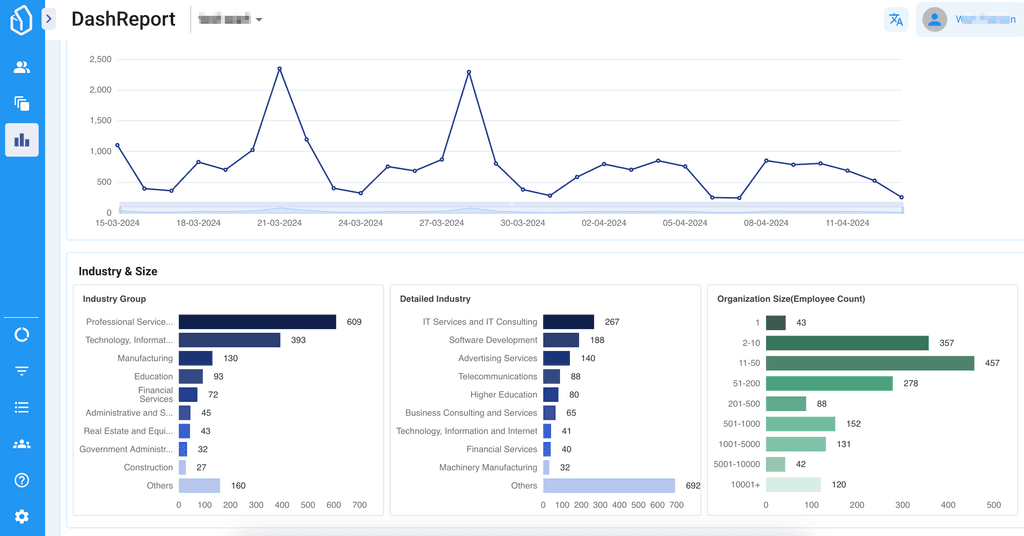

Supercharge your marketing results with LeadBoxer!
Analyze campaigns and traffic, segement by industry, drilldown on company size and filter by location. See your Top pages, top accounts, and many other metrics.


Supercharge your marketing results with LeadBoxer!
Analyze campaigns and traffic, segement by industry, drilldown on company size and filter by location. See your Top pages, top accounts, and many other metrics.


Supercharge your marketing results with LeadBoxer!
Analyze campaigns and traffic, segement by industry, drilldown on company size and filter by location. See your Top pages, top accounts, and many other metrics.


